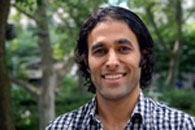A WINTER EVENING PROGRAM CO-SPONSORED BY THE WOMEN & SCIENCE AND PARENTS & SCIENCE INITIATIVES
Sun Exposure, Genetics, and Melanoma:
A Worldwide Health Challenge
| Date: |
Wednesday, February 19, 2014 |
Place: |
Abby Aldrich Rockefeller Hall |
| Registration: |
5:30 p.m. |
|
1230 York Avenue at 66th Street |
| Program: |
6:00 - 8:00 p.m. |
|
The Rockefeller University |
Melanoma, the most serious form of skin cancer, has been steadily on the rise in the United States and many other countries since the 1950s. Particularly troubling is the incidence in young people, especially young women. A study published by the Mayo Clinic in 2012, which compiled diagnoses recorded in a single Missouri county, showed that melanoma among men aged 18-39 quadrupled between 1969 and 2009. Among women of the same age during the same time period, the number of cases increased eightfold.
Exposure to ultraviolet radiation, from indoor tanning as well as natural sunlight, is seen as a major contributor to these trends. But the cause-effect relationship is not simple. Some melanomas are more likely than others to metastasize—to spread from the original site to other parts of the body. Although ultraviolet light can cause cancer-promoting damage to DNA, other genetic factors are also involved in melanoma. The effect of sun exposure and other environmental insults on the behavior of tumor cells is poorly understood.
 A clearer picture is beginning to emerge, however, from the laboratory of Sohail Tavazoie, Rockefeller University’s Leon Hess Assistant Professor and attending medical oncologist at Memorial Sloan-Kettering Cancer Center. Dr. Tavazoie’s research focuses on small molecules called microRNAS, which can stimulate or dampen specific genes. His laboratory has discovered microRNAs that are present at high levels in metastatic melanoma cells. He is studying these small molecules and their target genes in order to understand more about how melanoma becomes invasive. His group is also exploring potential therapeutic strategies to impede metastasis by blocking microRNAs.
A clearer picture is beginning to emerge, however, from the laboratory of Sohail Tavazoie, Rockefeller University’s Leon Hess Assistant Professor and attending medical oncologist at Memorial Sloan-Kettering Cancer Center. Dr. Tavazoie’s research focuses on small molecules called microRNAS, which can stimulate or dampen specific genes. His laboratory has discovered microRNAs that are present at high levels in metastatic melanoma cells. He is studying these small molecules and their target genes in order to understand more about how melanoma becomes invasive. His group is also exploring potential therapeutic strategies to impede metastasis by blocking microRNAs.
Dr. Tavazoie, who joined Rockefeller in 2009, heads the Elizabeth and Vincent Meyer Laboratory of Systems Cancer Biology. He is the recipient of numerous honors, including an Amanda and Jonathan Eilian Young Investigator Award from the Melanoma Research Alliance and an Emerald Foundation Young Investigator Award. He is also a Department of Defense Era of Hope Scholar.
The Women & Science and Parents & Science initiatives are pleased to co-host an evening program featuring Dr. Tavazoie. He will be joined by guest panelists Jennifer A. Stein, an assistant professor of dermatology at NYU Langone Medical Center, and Debra Black, a Rockefeller University Trustee and Co-Founder of the Melanoma Research Alliance. Rockefeller President and Carson Family Professor Marc Tessier-Lavigne will host the program.